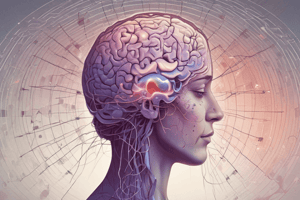Podcast
Questions and Answers
What percentage of patients with epilepsy have seizures completely controlled by optimal drug therapy?
What percentage of patients with epilepsy have seizures completely controlled by optimal drug therapy?
- 100%
- 50%
- 90%
- 75% (correct)
Which of the following mechanisms is NOT a way that antiepileptic drugs prevent proximal discharge?
Which of the following mechanisms is NOT a way that antiepileptic drugs prevent proximal discharge?
- Inhibit Ca2+ channel function
- Enhance GABA action
- Correct underlying neuronal abnormality (correct)
- Inhibit Na+ channel function
What is the primary mechanism of action of vigabatrin?
What is the primary mechanism of action of vigabatrin?
- Inhibits GABA transaminase (correct)
- Enhances GABAA activation
- Inhibits Na+ channel function
- Inhibits Ca2+ channel function
Which type of calcium channel is inhibited by ethosuximide?
Which type of calcium channel is inhibited by ethosuximide?
What is the primary mechanism of action of gabapentin?
What is the primary mechanism of action of gabapentin?
What is the estimated percentage of epilepsy cases that involve genetic mutations?
What is the estimated percentage of epilepsy cases that involve genetic mutations?
What is the mechanism of action of Levetiracetam in terms of synaptic transmission?
What is the mechanism of action of Levetiracetam in terms of synaptic transmission?
Which antiepileptic drug is known for its multiple mechanisms of action?
Which antiepileptic drug is known for its multiple mechanisms of action?
What is the primary problem with NMDA antagonists as antiepileptic drugs?
What is the primary problem with NMDA antagonists as antiepileptic drugs?
What is the effect of inhibiting T-type Ca2+ channels in terms of seizure type?
What is the effect of inhibiting T-type Ca2+ channels in terms of seizure type?
What are the three major categories of antiepileptic drugs?
What are the three major categories of antiepileptic drugs?
What percentage of the population is affected by epilepsy?
What percentage of the population is affected by epilepsy?
Which type of seizure is characterized by abrupt stopping of activity, staring vacantly for a few seconds, and abrupt recovery with no after effects?
Which type of seizure is characterized by abrupt stopping of activity, staring vacantly for a few seconds, and abrupt recovery with no after effects?
What is the main purpose of Electroencephalography (EEG)?
What is the main purpose of Electroencephalography (EEG)?
What is the name of the type of epilepsy that is associated with progressive mental retardation and excitotoxic neurodegeneration?
What is the name of the type of epilepsy that is associated with progressive mental retardation and excitotoxic neurodegeneration?
Which of the following is NOT a type of brain imaging?
Which of the following is NOT a type of brain imaging?
What is the term for the initial strong contraction of whole musculature that occurs during a tonic-clonic seizure?
What is the term for the initial strong contraction of whole musculature that occurs during a tonic-clonic seizure?
Kainic acid injection in the amygdaloidal nucleus of a rat results in spontaneous seizures within 24 hours.
Kainic acid injection in the amygdaloidal nucleus of a rat results in spontaneous seizures within 24 hours.
Electrically induced seizures can be prevented by GABA antagonists.
Electrically induced seizures can be prevented by GABA antagonists.
Valproate is primarily used to treat absence seizures due to its ability to block T-type Ca2+ channels.
Valproate is primarily used to treat absence seizures due to its ability to block T-type Ca2+ channels.
Tiagabine is used to treat partial seizures by inhibiting GABA transaminase.
Tiagabine is used to treat partial seizures by inhibiting GABA transaminase.
Carbamazepine is effective in treating all types of seizures, including absence seizures.
Carbamazepine is effective in treating all types of seizures, including absence seizures.
Levetiracetam binds to voltage-gated Na+ channels
Levetiracetam binds to voltage-gated Na+ channels
Topiramate is a specific inhibitor of T-type Ca2+ channels
Topiramate is a specific inhibitor of T-type Ca2+ channels
NMDA antagonists have a wide therapeutic window
NMDA antagonists have a wide therapeutic window
Ethosuximide is an inhibitor of voltage-gated Na+ channels
Ethosuximide is an inhibitor of voltage-gated Na+ channels
All antiepileptic drugs act by enhancing GABA action
All antiepileptic drugs act by enhancing GABA action
Antiepileptic drugs work by enhancing the action of Na+ channels.
Antiepileptic drugs work by enhancing the action of Na+ channels.
Generalised seizures always begin with a local discharge before spreading to other parts of the brain.
Generalised seizures always begin with a local discharge before spreading to other parts of the brain.
Magnetic Resonance Imaging (MRI) is used to detect electrical activity in the brain.
Magnetic Resonance Imaging (MRI) is used to detect electrical activity in the brain.
Psychomotor seizures are characterized by involuntary jerking of a muscle group.
Psychomotor seizures are characterized by involuntary jerking of a muscle group.
Lennox-Gastaut syndrome is a type of partial seizure disorder.
Lennox-Gastaut syndrome is a type of partial seizure disorder.
Flashcards are hidden until you start studying
Study Notes
Overview of Epilepsy
- Epilepsy is a common disorder characterized by seizures, which affect 0.5-1% of the population
- Often, there is no recognizable cause, but it can be caused by brain damage, inherited neurological syndromes, trauma, stroke, infection, or tumour
- Epilepsy is a neurological disorder that exhibits periodic seizures, which are episodic high-frequency discharges of impulses by a group of neurons (focus)
Imaging
- Electroencephalography (EEG) detects electrical activity, recording from electrodes, and recognizes the type of seizure by nature and distribution of the abnormal discharge
- Magnetic Resonance Imaging (MRI) and Positron Emission Tomography (PET) are also used for imaging
Types of Epilepsy
- Partial seizures:
- Jacksonian epilepsy: Focus in motor cortex, repetitive involuntary jerking of a muscle group, begins one side of body, and spreads
- Psychomotor epilepsy: Consists of purposed movements, lasts a few minutes, and patient recovers with no recollection
- Generalised seizures:
- Tonic-clonic: Two phases, initial strong contraction of whole musculature (tonic phase), and series of violent, synchronous jerks (clonic phase)
- Absence seizure: Abruptly stops activity, stares vacantly for a few seconds, and recovers abruptly with no after effects
- Lennox-Gastaut: Severe, associated with progressive mental retardation, due to excitotoxic neurodegeneration
Antiepileptic Drugs
- Mechanism of action:
- Enhance GABA action
- Inhibit Na+ channels
- Inhibit Ca2+ channels
- Examples:
- Benzodiazepines: Enhance activation of GABAA, used for acute seizures in children and status epilepticus
- Vigabatrin: Irreversibly inhibits GABA transaminase (GABA-T), used for all types of epilepsy
- Carbamazepine: Voltage-gated Na+ channel blockers, used for all types of epilepsy except absence seizures
- Ethosuximide: T-type Ca2+ channel inhibition, used for absence seizures
- Galapentin: P/Q-type Ca2+ channel inhibition, used for partial seizures
- Valproate: Used for all types of epilepsy, especially effective in infantile epilepsy
- Levetiracetam: Binds synaptic vesicle protein 2A (SV2A), interferes with NT release, used for partial seizures
- Topiramate: Blocks Na+ and Ca2+ channels, enhances GABA action, and blocks AMPA, used for partial and generalised seizures
Studying That Suits You
Use AI to generate personalized quizzes and flashcards to suit your learning preferences.




